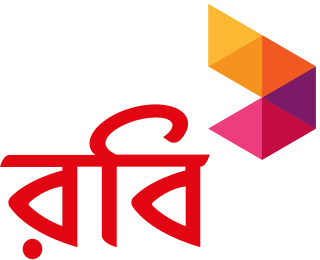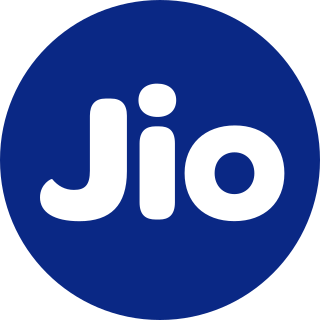Related Research Articles
India's telecommunication network is the second largest in the world by number of telephone users with over 1.1 billion subscribers as of December 2023. It has one of the lowest call tariffs in the world enabled by multiple large-scale telecom operators and the ensuant hyper-competition between them. India has the world's second largest Internet user-base with over 904 million broadband internet subscribers as of December 2023.

Robi Axiata PLC. is the second largest mobile network operator in Bangladesh. Axiata of Malaysia holds a major controlling stake of 61.82% in the company, while Bharti Airtel of India holds 28.18% and investors in DSE and CSE hold 10%. Robi first commenced operation in 1997 as Telekom Malaysia International (Bangladesh) with the brand name ‘AKTEL’. In 2010, the company was re-branded to ‘Robi’ and the company changed its name to Robi Axiata Limited. As per government rule, the name changed to Robi Axiata PLC in 2024 as Robi is listed in Stock Market and a Public Limited Company. Robi Axiata has spectrum on GSM 900, 1800 and 2100 MHz bands. On 16 November 2016, Airtel Bangladesh was merged into Robi as a product brand of Robi, where Robi Axiata PLC is the licensee of Airtel brand only in Bangladesh. Having successfully completed the merger process, Robi has emerged as the second largest mobile phone operator in Bangladesh.

Bharti Airtel Limited is an Indian multinational telecommunications services company based in New Delhi. It operates in 18 countries across South Asia and Africa, as well as the Channel Islands. Currently, Airtel provides 5G, 4G and LTE Advanced services throughout India. Currently offered services include fixed-line broadband, and voice services depending upon the country of operation. Airtel had also rolled out its Voice over LTE (VoLTE) technology across all Indian telecom circles. It is the second largest mobile network operator in India and the second largest mobile network operator in the world. Airtel was named India's 2nd most valuable brand in the first ever Brandz ranking by Millward Brown and WPP plc.

MEO is a mobile and fixed telecommunications service and brand from Altice Portugal, managed by MEO - Serviços de Comunicações e Multimédia. The service was piloted in Lisbon in 2007 and was later extended to Porto and Castelo Branco.

Internet in India began in 1986 and was initially available only to the educational and research community. General public access to the internet in India began on 15 August 1995. By 2023, India had more than 900 million Internet users. It is reported that in 2022 an average mobile Internet consumption in India was 19.5 GB per month and the mobile data usage per month rose from 4.5 exabytes in 2018 to 14.4 exabytes in 2022.
WorldLink Communications is an Internet service provider in Nepal. The nation's largest ISP, it has 900,000 active consumer accounts and 2,000 business accounts, along with approximately 25,000 subscribers to its NET TV IPTV service, and covers 73 of the nation's 77 districts. As of 2023, it has around 700,000 fiber to the home customers and 31% market share in Nepal.

Videocon Telecommunications Limited, formerly Videocon Mobile Services, was an Indian cellular service provider that offered GSM mobile services in India under the brand name Videocon. The company was a subsidiary of the Videocon Group, and was headquartered at Gurgaon, Haryana. Videocon launched its services on 7 April 2010 in Mumbai. At its peak, Videocon held licences to provide mobile services in 18 out of 22 telecom circles of India. However, Videocon launched commercial services only in 11 out of the 18 circles it held licences in. Following the 2G spectrum case, the Supreme Court cancelled 122 licences issued by the Indian Government in 2008, including 21 licences belonging to Videocon.
An over-the-top media service is a digital distribution service offered directly to viewers via the public Internet, rather than through an over-the-air, cable, or satellite-based provider. The term is synonymous with "streaming platform", such as Netflix and Amazon Prime Video which provide access to subscription-based film and television content (SVoD).
Wikipedia Zero was a project by the Wikimedia Foundation to provide access to Wikipedia free of charge on mobile phones via zero-rating, particularly in developing markets. The objective of the program was to facilitate access to free knowledge for low-income pupils and students, by means of waiving the network traffic cost. With 97 operators in over 72 countries, it was estimated that access to Wikipedia was provided to more than 800 million people through the program. The program ended in 2018.
Internet.org is a partnership between social networking services company Meta Platforms and six companies that plans to bring affordable access to selected Internet services to less developed countries by increasing efficiency, and facilitating the development of new business models around the provision of Internet access. The app delivering these services was renamed Free Basics in September 2015. As of April 2018, 100 million people were using internet.org.
Facebook Zero is an initiative undertaken by social networking service company Facebook in collaboration with mobile phone-based Internet providers, whereby the providers waive data (bandwidth) charges for accessing Facebook on phones via a stripped-down text-only version of its mobile website. The stripped-down version is available online only through providers who have entered the agreement with Facebook. Photos are not loaded by default. Users may still choose to view them by clicking through but regular data charges apply to photo use.
Google Free Zone was a global initiative undertaken by the Internet company Google in collaboration with mobile phone-based Internet providers, whereby the providers waive data (bandwidth) charges for accessing select Google products such as Google Search, Gmail, and Google+. In order to use this service, users were required to have a Google account and a phone that had access to an internet connection.

Zero-rating is the practice of providing Internet access without financial cost under certain conditions, such as by permitting access to only certain websites or by subsidizing the service with advertising or by exempting certain websites from the data allowance.
Mechanisms for establishing rules ensuring net neutrality in India, are at present mainly enforced by the Telecom Regulatory Authority of India (TRAI). At present, there are no specific legislation regarding Net Neutrality in India.

Airtel India is the second largest provider of mobile telephony and third largest provider of fixed telephony in India, and is also a provider of broadband and subscription television services. The brand is operated by several subsidiaries of Bharti Airtel, with Bharti Hexacom and Bharti Telemedia providing broadband fixed line services and Bharti Infratel providing telecom passive infrastructure service such as telecom equipment and telecom towers. Currently, Airtel provides 5G, 4G and 4G+ services all over India. Currently offered services include fixed-line broadband, and voice services depending upon the country of operation. Airtel had also rolled out its VoLTE technology across all Indian telecom circles.

Nikhil Pahwa is an Indian journalist, digital rights activist, and founder of MediaNama, a mobile and digital news portal. He has been a key commentator on stories and debates around Indian digital media companies, censorship and Internet and mobile regulation in India.

Reliance Jio Infocomm Limited is an Indian telecommunications company and a subsidiary of Jio Platforms, headquartered in Navi Mumbai, Maharashtra. It operates a national LTE network with coverage across all 22 telecom circles. Jio offers 5G, 4G and 4G+ services all over India. Its 6G service is in the works.
Net neutrality is the principle that governments should mandate Internet service providers to treat all data on the Internet the same, and not discriminate or charge differently by user, content, website, platform, application, type of attached equipment, or method of communication. For instance, under these principles, internet service providers are unable to intentionally block, slow down or charge money for specific websites and online content.
References
- ↑ Chhavi. "Aircel Adds Highest Number of GSM Subscribers in August followed by Airtel; Vodafone Loses : COAI". Telecomtalk.info. Retrieved 24 April 2015.
- ↑ Saxena, Anupam (6 April 2015). "Airtel Zero: Another blow to Net Neutrality". The Times of India. Retrieved 24 April 2015.
- ↑ ETbureau (7 April 2015). "Critics warn Airtel for flouting net neutrality; startups, others can offer apps for free on platform". The Economic Times. Archived from the original on 10 April 2015. Retrieved 24 April 2015.
- ↑ Soni, Aayush (8 February 2016). "India deals blow to Facebook in people-powered 'net neutrality' row". The Guardian. ISSN 0261-3077 . Retrieved 9 March 2017.
- ↑ Punit, Itika Sharma. "The lawyers, techies, and comedians who fought Facebook to keep India's internet free and open". Quartz. Retrieved 9 March 2017.
- ↑ "TRAI supports Net Neutrality, effectively bans Free Basics: All that happened in this debate". The Indian Express. 29 December 2015. Retrieved 9 March 2017.